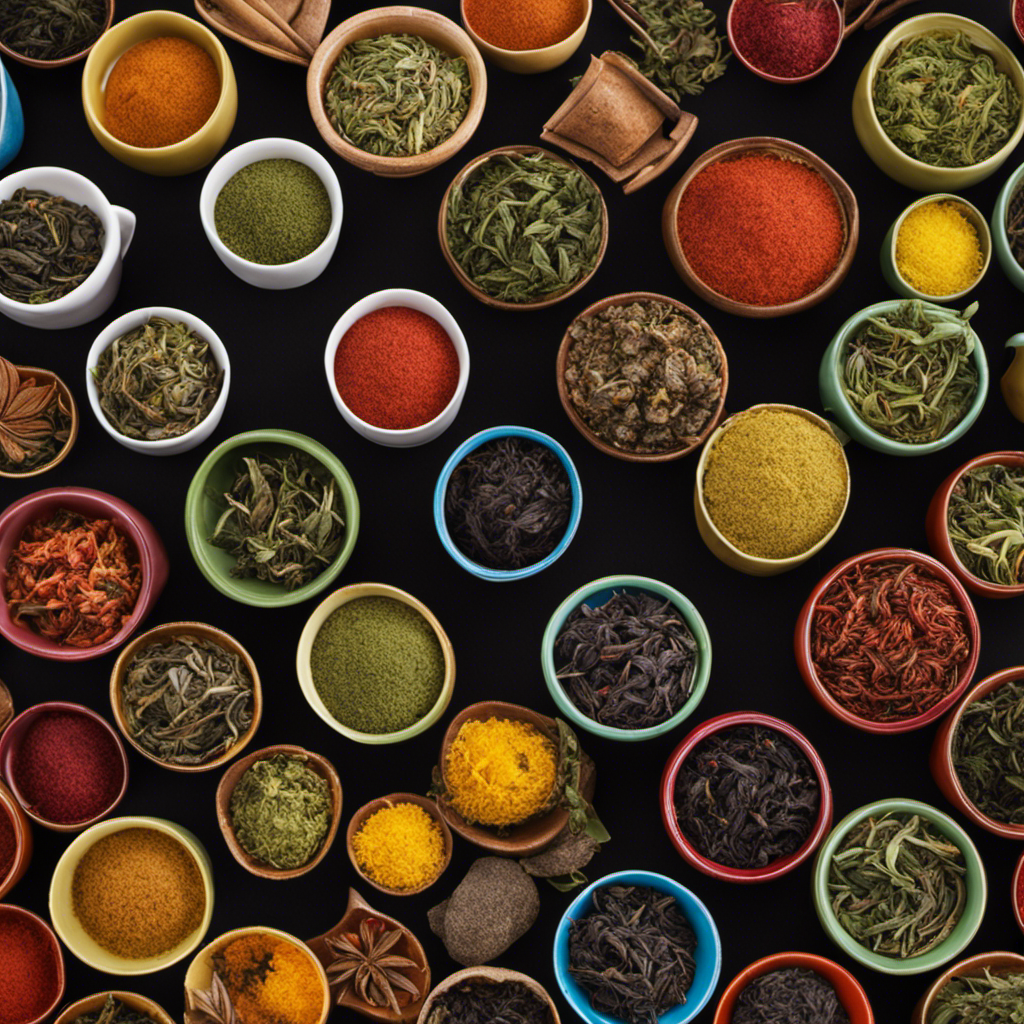Turmeric Tea
What Happens When You Drink Turmeric Tea Everyday?

They say that health is wealth, and I couldn’t agree more. As someone who prioritizes my well-being, I am always on the lookout for natural remedies to improve my overall health.
One such remedy that has piqued my interest lately is turmeric tea. Turmeric, a spice commonly used in Indian cuisine, has been praised for its numerous health benefits. In fact, it has been dubbed as the ‘golden spice’due to its vibrant color and impressive medicinal properties.
But what happens when you drink turmeric tea every day? Is it worth incorporating into your daily routine? Let’s dive deeper into the world of turmeric and find out.
Key Takeaways
- Drinking turmeric tea every day can improve overall health due to the high concentration of curcumin, a compound with strong anti-inflammatory and antioxidant properties.
- Regular consumption of turmeric tea can alleviate symptoms of chronic inflammation, boost the immune system, improve gut health, and prevent common digestive issues.
- Turmeric tea has potential benefits for skin health, memory retention, and mood regulation, and may potentially be used as a treatment option for neurodegenerative conditions.
- However, precautions need to be taken when consuming turmeric, as excessive consumption can lead to adverse effects such as liver and kidney damage, and it may interact with certain medications. Pregnant women or those trying to conceive should also be cautious when consuming turmeric tea.
What is Turmeric Tea?
Turmeric tea is a delicious and soothing beverage that’s packed with incredible health benefits! This tea has been a part of traditional medicine practices for centuries in South Asia, where turmeric originates. The use of turmeric as a spice and medicinal herb dates back more than 4,000 years. It was used in Ayurvedic medicine to treat various ailments such as colds, respiratory issues, stomach problems, and even wounds.
Turmeric tea also holds significant cultural significance in India. In Hinduism, it’s considered holy and is used in religious ceremonies and rituals. The vibrant golden color of the tea symbolizes purity, prosperity, and good luck.
Overall, turmeric tea has been an essential part of the Indian culture for thousands of years due to its numerous health benefits. Now let’s talk about those benefits!
The Health Benefits of Turmeric Tea
Consuming this flavorful beverage on a daily basis can provide numerous health advantages that are worth exploring. Turmeric tea benefits include its anti-inflammatory and antioxidant properties, which may help reduce the risk of chronic diseases such as cancer and heart disease. Additionally, turmeric tea has been shown to have potential benefits for brain function and mood regulation.
When it comes to daily consumption tips, it’s important to note that turmeric tea is best enjoyed in moderation. While there is no specific recommended daily intake, it’s generally safe to consume one to two cups per day. It’s also important to make sure you’re using high-quality turmeric powder or fresh turmeric root when making your tea. Adding black pepper or a source of fat (such as coconut oil) can enhance the absorption of curcumin, the active compound in turmeric responsible for its health benefits.
Turmeric tea and weight loss will be discussed in the next section, but first let’s dive deeper into how this powerful spice can benefit our overall health.
Turmeric Tea and Weight Loss
I’ve been looking into the benefits of turmeric tea for weight loss, and there are a couple of key points that I find particularly interesting.
First, it can help boost metabolism and increase fat burning.
Second, it may have appetite-suppressing properties that can help reduce calorie intake.
Based on my research, incorporating turmeric tea into your daily routine could be a helpful addition to any weight loss plan.
Metabolism and Fat Burning
You’ll be pleased to know that drinking turmeric tea regularly can speed up your metabolism and enhance fat burning. This is because turmeric contains an active compound called curcumin, which has various health benefits.
Here are some ways in which turmeric tea can help with metabolism and fat burning:
-
Increases thermogenesis: Curcumin has been shown to increase thermogenesis, the process by which the body burns calories for energy. This means that drinking turmeric tea can help you burn more calories throughout the day.
-
Reduces inflammation: Inflammation in the body can lead to insulin resistance, which hinders metabolic function. Turmeric’s anti-inflammatory properties can improve insulin sensitivity and enhance metabolic rate.
-
Improves digestion: A healthy digestive system is crucial for efficient metabolism and weight management. Turmeric tea helps improve digestion by increasing bile production in the liver, aiding in fat breakdown.
With its ability to boost immunity, improve digestion, and aid in metabolism and fat burning, it’s no wonder why turmeric has become a popular ingredient in wellness circles. But did you know that it also has appetite suppressing properties? Let’s delve into this topic further.
Appetite Suppression
Feeling constantly hungry and struggling with food cravings can be frustrating, but incorporating turmeric tea into your routine may help suppress your appetite and make it easier to stick to a healthy diet. Studies have shown that curcumin, the active ingredient in turmeric, can reduce hunger and suppress cravings for unhealthy foods.
To understand how turmeric tea can help with appetite suppression, let’s take a look at the following table:
Mechanism Explanation Evidence Increases leptin levels Leptin is a hormone that signals fullness to the brain. Curcumin has been shown to increase levels of this hormone. A study found that taking curcumin supplements for 30 days increased leptin levels by 23%. Regulates blood sugar levels Unstable blood sugar levels can lead to increased hunger and cravings. Curcumin has been shown to regulate these levels, reducing feelings of hunger. In a study of overweight individuals with insulin resistance, those who took curcumin supplements had significantly lower fasting blood sugar levels than those who didn’t. Boosts metabolism While not directly related to appetite suppression, an increased metabolism can help burn more calories and reduce overall hunger. Curcumin has been shown to boost metabolic rate in some studies. A 2015 study found that curcumin supplementation led to significant increases in metabolic rate compared to placebo.
By suppressing cravings and reducing hunger through these mechanisms, drinking turmeric tea daily may be an effective strategy for weight management and promoting overall health. Next up: drinking turmeric tea for heart health!
Drinking Turmeric Tea for Heart Health
Consuming turmeric tea on a daily basis can potentially improve your heart health by reducing inflammation and improving blood flow. Here are three ways in which drinking turmeric tea daily can help prevent heart disease:
-
Reduces Inflammation: Turmeric contains curcumin, a powerful anti-inflammatory compound that reduces inflammation throughout the body. Chronic inflammation is a leading contributor to heart disease.
-
Improves Blood Flow: Turmeric has been shown to improve endothelial function, which is the ability of the inner lining of blood vessels to relax and expand properly. This leads to improved blood flow, lower blood pressure, and reduced risk of heart disease.
-
Lowers Cholesterol Levels: Curcumin in turmeric may help reduce LDL cholesterol levels in the bloodstream. High levels of LDL cholesterol (the ‘bad’ cholesterol) are associated with an increased risk of heart disease.
Next up, we’ll discuss how turmeric tea can potentially aid in cancer prevention without writing ‘step’.
Turmeric Tea and Cancer Prevention
Drinking turmeric tea has been found to have numerous health benefits, including improving heart health. However, the benefits of turmeric tea do not stop there. Studies have also shown that turmeric tea may aid in cancer prevention and boost the immune system.
Turmeric contains a compound called curcumin, which has been found to have anti-cancer properties. Curcumin has been shown to inhibit the growth of different types of cancer cells, including breast, prostate, lung, and colon cancer cells. Additionally, it may help prevent cancer by reducing inflammation in the body and preventing damage to DNA. Drinking turmeric tea regularly can provide a natural way to incorporate curcumin into your diet and potentially reduce your risk of developing certain types of cancers.
Benefits Evidence Anti-inflammatory properties A study published in Oncogene found that curcumin inhibits inflammation at the molecular level Immune system boost A study published in the Journal of Clinical Immunology found that curcumin enhances antibody responses and activates immune cells
In addition to its potential anti-cancer effects, turmeric tea may also provide an immune system boost. Curcumin has been found to enhance antibody responses and activate immune cells such as T-lymphocytes and B-lymphocytes. This can help strengthen your body’s defense against infections and diseases.
As we move on to discussing the benefits of turmeric tea for skin health, it is important to note that incorporating this beverage into our daily routine can have significant impacts on our overall well-being.
Turmeric Tea for Skin Health
Turmeric tea isn’t just good for cancer prevention and boosting the immune system; it also has potential benefits for your skin health. Drinking it regularly can help you achieve glowing skin.
The anti-inflammatory properties of turmeric can reduce inflammation in the body, which often leads to various skin issues like acne, eczema, and psoriasis. Additionally, turmeric contains antioxidants that can protect the skin from damage caused by free radicals.
Apart from reducing inflammation and protecting the skin, turmeric tea can also improve your complexion by reducing dark circles and pigmentation. It can enhance collagen production in the body, helping to maintain skin elasticity and firmness. Therefore, incorporating a cup of turmeric tea into your daily routine may lead to healthier and more radiant-looking skin.
It’s important to note that the anti-inflammatory properties of turmeric are not just limited to skincare but also extend to relieving pain and inflammation in joints caused by arthritis. As we move on to the next section about “turmeric tea and arthritis relief,”keep this in mind.
Turmeric Tea and Arthritis Relief
Relieve the pain and inflammation in your joints caused by arthritis with a comforting cup of turmeric tea. As someone who’s struggled with arthritis for years, I can attest to the benefits of incorporating turmeric tea into my daily routine.
Here are three ways that this ancient spice can help manage your arthritis:
- Inflammation reduction: Turmeric contains a compound called curcumin that has anti-inflammatory properties. By reducing inflammation in the body, turmeric can help alleviate joint pain and stiffness.
- Pain relief: Studies have shown that curcumin may also act as a natural pain reliever by blocking certain enzymes in the body that cause inflammation and pain.
- Antioxidant protection: Arthritis causes oxidative stress in the body, which can lead to further damage to joint tissues. The antioxidants found in turmeric can help protect against this stress and promote overall joint health.
With all these benefits, it’s no wonder why turmeric tea is becoming increasingly popular among those seeking natural remedies for arthritis management.
Overview of Turmeric and Its Health Benefits
Turmeric’s health benefits are vast, making it a popular ingredient in everyday meals and drinks like turmeric tea. This spice has been used for centuries in traditional medicine to treat various ailments such as inflammation, digestive issues, and skin problems. Research has shown that turmeric contains curcumin, a compound with strong anti-inflammatory and antioxidant properties.
In addition to its medicinal properties, turmeric is also known for its versatility in cooking. Turmeric recipes range from savory dishes like curry to sweet treats like golden milk lattes. You can even find turmeric supplements in the form of capsules or powders at health food stores.
Drinking turmeric tea everyday can have numerous health benefits due to the high concentration of curcumin. However, it’s important to note that the nutritional content of turmeric tea may vary depending on how it’s prepared and what other ingredients are added to it.
With that said, let’s take a closer look at the nutritional content of turmeric tea and how it can benefit our health.
Nutritional Content of Turmeric Tea
Did you know that sipping on a warm cup of turmeric tea can provide your body with essential nutrients such as iron, potassium, and vitamin C? This spicy beverage is not only delicious but also packs a nutritional punch. Turmeric contains curcumin, which has been linked to numerous health benefits.
Health benefits:
- Anti-inflammatory properties: Curcumin in turmeric tea has potent anti-inflammatory effects that may reduce inflammation in the body. Chronic inflammation is linked to numerous diseases such as heart disease, cancer, and diabetes.
- Immune system support: Turmeric tea contains antioxidants that help protect cells from damage caused by free radicals. These antioxidants also boost the immune system and improve overall health.
Preparation methods:
- Boil water and add 1 teaspoon of ground turmeric or grated fresh turmeric root.
- Add other ingredients such as ginger, cinnamon, honey, or lemon for added flavor and health benefits.
Please note that the nutritional content may vary depending on the specific recipe and ingredients used to prepare turmeric tea. The values provided above are approximate and represent a general estimate.
Turmeric tea is a beverage made from powdered or freshly grated turmeric, a spice known for its potential health benefits. However, the specific nutritional content can vary widely depending on how the tea is made and what other ingredients are included. Here’s a basic idea of what you might get from a typical cup of turmeric tea made with one teaspoon of turmeric:
- Turmeric: 1 teaspoon of turmeric contains about 9 calories, 2 grams of carbohydrates, and 0.3 grams of protein. It is also a rich source of manganese and iron and contains smaller amounts of vitamin B6, dietary fiber, copper, and potassium.
- Water: Water doesn’t add any calories or nutrients, but it’s crucial for hydration and overall health.
That’s for the simplest version of turmeric tea: just turmeric and water. Many people add other ingredients to their turmeric tea, such as:
- Honey: 1 tablespoon of honey has around 64 calories and 17 grams of sugar. It also contains trace amounts of vitamins and minerals.
- Lemon juice: The juice from half a lemon contains about 6 calories and is an excellent source of vitamin C.
- Black pepper: Some people add a pinch of black pepper to enhance absorption of curcumin, the active compound in turmeric. One pinch of black pepper has negligible calories and nutrients.
- Milk or a milk alternative: A cup of whole milk adds about 149 calories, 8 grams of protein, and significant amounts of calcium and vitamin D. Non-dairy milks have varying nutritional profiles but are generally lower in calories and protein and often fortified with calcium and vitamin D.
- Ginger: This can add flavor and potential health benefits. One teaspoon of ginger has about 2 calories.
- Cinnamon: Another popular addition, 1 teaspoon of cinnamon adds about 6 calories and a wide array of antioxidants.
Keep in mind that while the nutritional content might not seem impressive in terms of macros like proteins, carbs, and fats, turmeric is renowned for its potential health benefits, largely due to curcumin, its primary active compound. Curcumin has anti-inflammatory and antioxidant properties, among others.
As always, it’s best to enjoy turmeric tea as part of a balanced diet rather than relying on it for significant nutritional intake.
As you can see, drinking turmeric tea every day can have many positive effects on your health. In the next section, we’ll explore how its anti-inflammatory properties can benefit you even further.
Anti-Inflammatory Properties
It’s no coincidence that turmeric tea has become a popular remedy for reducing inflammation in the body. Turmeric contains curcumin, a compound known for its anti-inflammatory properties. Drinking turmeric tea every day can help alleviate symptoms of chronic inflammation, such as joint pain and stiffness.
There are many ways to prepare turmeric tea recipes, but the most common method involves boiling water and adding ground turmeric. Some people prefer to add other ingredients like ginger or honey to enhance the flavor and health benefits.
The best time to drink turmeric tea is in the morning or before bed, as it can aid digestion and promote relaxation. In addition to reducing inflammation, drinking turmeric tea regularly also boosts your immune system. Curcumin has been shown to have antimicrobial properties that can help fight off infections and improve overall immunity.
So why not start incorporating this powerful spice into your daily routine? Your body will thank you!
Boosts Immune System
Get ready to strengthen your immune system by adding a daily cup of turmeric tea to your routine! Turmeric is known for its immune-boosting properties, and drinking turmeric tea can help improve your body’s ability to fight off infections and diseases. This is because turmeric contains compounds that have been shown to increase the activity of certain immune cells.
In addition to boosting immunity, turmeric tea may also be helpful for people with allergies or skin problems. Studies have found that curcumin, the active ingredient in turmeric, has anti-allergic and anti-inflammatory effects. This means that drinking turmeric tea could potentially reduce symptoms associated with allergies, such as sneezing, itching, and congestion. Additionally, some research suggests that applying a paste made from turmeric powder and water directly onto the skin may help improve skin health by reducing inflammation and promoting wound healing.
To further understand how consuming turmeric tea can benefit our health, let’s take a look at this 2-column table:
BENEFITS TURMERIC TEA Boosts Immune System Contains compounds that enhance immune cell activity Reduces Allergy Symptoms Has anti-allergic effects that can alleviate common allergy symptoms Promotes Skin Health Can reduce inflammation and promote wound healing when applied topically
Drinking turmeric tea regularly can be an easy way to boost your overall health and well-being. Not only does it provide immunity benefits, but it may also help alleviate allergy symptoms or improve skin health. In the next section we will explore how consuming this powerful spice aids in digestion.
Aids in Digestion
Improve your digestion with the help of turmeric tea, as it contains compounds that aid in the breakdown and absorption of nutrients. The active ingredient in turmeric, curcumin, has been found to improve gut health by reducing inflammation and promoting healthy bacteria growth in the digestive tract. These properties can lead to better overall digestion and nutrient absorption.
Furthermore, curcumin is known to stimulate the production of digestive enzymes in the pancreas. These enzymes play a crucial role in breaking down carbohydrates, proteins, and fats into smaller molecules that can be absorbed by the body. By increasing enzyme production, turmeric tea can help support optimal digestion and prevent common digestive issues such as bloating, gas, and constipation.
Incorporating turmeric tea into your daily routine may have significant benefits for your digestive system. Its ability to promote healthy gut bacteria growth and increase enzyme production makes it an effective tool for improving overall digestion.
Next up, we’ll discuss how this golden drink can also improve brain function without writing ‘step’.
Improves Brain Function
As I mentioned earlier, turmeric tea has been known to aid in digestion. But did you know that drinking this tea regularly may also improve brain function? Yes, you heard that right! Turmeric tea can benefit your brain as well.
Studies have shown that turmeric contains a compound called curcumin, which has anti-inflammatory and antioxidant properties. These properties can help protect the brain from damage and improve cognitive performance.
Here are some ways in which turmeric tea may benefit your brain:
- Boosts memory: Regular consumption of turmeric tea has been linked to improved memory retention and recall.
- Enhances mood: Curcumin in turmeric is believed to boost levels of serotonin and dopamine, two neurotransmitters responsible for regulating mood.
- Reduces risk of neurodegenerative diseases: The anti-inflammatory properties of curcumin make it a potential treatment option for Alzheimer’s disease and other neurodegenerative conditions.
Incorporating turmeric tea into your daily routine could be an easy way to support your brain health. However, it’s important to note that more research is needed on the effects of curcumin on the brain.
Moving forward, let’s discuss some potential side effects of consuming too much turmeric or drinking too much turmeric tea.
Potential Side Effects
Now, I know you’re excited to add turmeric tea to your routine, but let me warn you – overdoing it can lead to some pretty unpleasant side effects. While turmeric has a host of health benefits, consuming too much of it can have long term effects on your body.
High doses of curcumin, the active ingredient in turmeric, may cause liver and kidney damage. It’s also important to note that turmeric tea may interact with certain medications. If you’re taking blood thinners or medication for diabetes, talk to your doctor before adding turmeric tea to your diet. Turmeric has natural blood-thinning properties and can interfere with certain diabetes medications.
If you’re pregnant or trying to conceive, be cautious when drinking turmeric tea. There’s not enough research on the safety of consuming high amounts of curcumin during pregnancy. In some cases, it may even cause contractions and early labor.
In conclusion, while turmeric tea is a great addition to any healthy lifestyle in moderation, it’s important to be aware of potential side effects when consumed in excess or in combination with certain medications. As we move onto the next section about recommended dosage, keep these factors in mind for safe and effective use of this powerful herb.
Recommended Dosage
To fully reap the benefits of turmeric, it’s crucial to understand the recommended dosage for consumption. Turmeric tea dosage varies depending on its form and preparation method, whether it’s fresh or dried, powdered or grated. However, in general, experts suggest a safe intake level of 1-3 grams per day for daily consumption and a maximum limit of 8 grams per day.
When preparing turmeric tea, it’s important to measure and use only the recommended amount. Adding too much can lead to adverse effects such as nausea, diarrhea, stomach upset, or even liver damage. Therefore, precautions need to be taken when using turmeric supplements or extracts.
Numerous studies have shown that curcumin – one of the active compounds found in turmeric – has various health effects such as anti-oxidant and anti-inflammatory properties which may contribute towards cancer prevention and heart health. While evidence suggests that consuming turmeric tea within the recommended amount can be beneficial to our health, overconsumption may result in unwanted risks. Therefore, it’s essential to take into account how much is too much when incorporating this spice into your diet.
Other ways to incorporate turmeric into your diet include adding it as a spice in cooking dishes such as rice or vegetables or mixing it with warm milk before bedtime. These methods allow you to enjoy its flavor and reap its potential benefits without having to worry about exceeding the safe intake limit provided by experts.
Other Ways to Incorporate Turmeric into Your Diet
If you’re looking for more ways to spice up your meals, try adding a pinch of turmeric to your rice or veggies for a flavorful and healthy boost. Turmeric is a versatile spice that can be used in various dishes such as curries, soups, stews, and marinades.
You can also prepare turmeric tea, which is an easy way to incorporate this superfood into your daily routine. Another popular way of consuming turmeric is through a turmeric latte. This drink is made by combining turmeric powder with milk or non-dairy milk alternatives like almond or coconut milk.
You can sweeten it with honey or maple syrup and add some cinnamon for extra flavor. Turmeric lattes are not only delicious but also packed with antioxidants and anti-inflammatory compounds that help improve digestion, boost immunity, and reduce inflammation.
Lastly, you can make a refreshing turmeric smoothie by blending fresh or frozen fruits like banana, mango or pineapple with spinach or kale leaves, ginger root and a tsp of turmeric powder. You can use water or coconut water as the base liquid and add some ice cubes for texture.
This smoothie is rich in vitamins C & K, minerals like iron & potassium as well as fiber which helps regulate blood sugar levels and promote heart health. Drinking this smoothie regularly will not only nourish your body but also keep you energized throughout the day!
Now let’s move on to how to make this delicious and healthy beverage at home!
How to Make Turmeric Tea
After learning about how turmeric tea can alleviate arthritis pain, I wanted to try making my own cup of this golden brew. Making turmeric tea is actually quite simple and only requires a few ingredients.
To make the basic version, all you need is water, turmeric powder, and black pepper. The black pepper helps with the absorption of curcumin, which is the active ingredient in turmeric that provides its anti-inflammatory benefits.
There are also many variations of turmeric tea available by adding ingredients such as ginger or cinnamon for added flavor and health benefits. Personally, I like to add a spoonful of honey to my turmeric tea for its natural sweetness and additional anti-inflammatory properties. Honey also has antimicrobial properties that can help fight off infections in the body.
Adding honey to your turmeric tea can enhance its taste while providing an extra boost to your immune system.
Moving on from discussing how to make delicious cups of turmeric tea, it’s important to be aware of potential side effects and precautions when consuming this drink regularly.
Potential Side Effects and Precautions
Before incorporating turmeric tea into your daily routine, it’s important to be aware of potential side effects and precautions. While turmeric is generally considered safe for most people when consumed in small amounts through food, supplements or teas, there are some possible risks associated with consuming large amounts of turmeric or taking supplements. These include gastrointestinal problems such as nausea, bloating and gas, as well as an increased risk of bleeding if you’re taking blood-thinning medications.
It’s important to note that the dosage recommendations for turmeric can vary depending on the form in which it’s consumed. For example, a typical dose for curcumin (the active ingredient in turmeric) supplements ranges from 500-2,000 milligrams per day. However, when drinking turmeric tea, it’s suggested to consume no more than two cups per day to avoid any potential adverse effects. It’s always a good idea to talk to your healthcare provider before adding any new supplement or beverage into your daily routine to ensure it doesn’t interfere with any medications you may be taking or cause any unwanted side effects.
Possible Side Effects Precautions Gastrointestinal issues such as nausea and bloating Consume turmeric tea in moderation Increased risk of bleeding if taking blood-thinning medications Consult with a healthcare provider before consuming Allergic reactions such as hives or rash Discontinue use if allergic reaction occurs Interference with certain medications such as chemotherapy drugs Talk to a healthcare provider before consuming
The table above outlines some possible side effects and precautions associated with consuming turmeric tea. While these risks are relatively low when consumed in moderation, it’s still important to be aware of them before incorporating this beverage into your daily routine. By following recommended dosage guidelines and consulting with a healthcare provider if necessary, you
Frequently Asked Questions
Can turmeric tea help with weight loss?
Turmeric tea is a powerful drink that can offer numerous benefits, especially when it comes to weight loss. Studies have shown that curcumin, the active ingredient in turmeric, can help reduce inflammation and improve digestion, both of which are important for maintaining a healthy weight.
Additionally, turmeric tea recipes often incorporate other ingredients like ginger or lemon, which can further enhance its health benefits. While there’s no magic solution for weight loss, incorporating turmeric tea into your daily routine could be a helpful step toward achieving your goals.
So why not try adding this delicious and beneficial beverage to your diet today?
How long does it take for turmeric tea to start working?
As someone who’s been incorporating turmeric tea into my daily routine for several months, I’ve noticed significant benefits from long-term consumption.
While it may vary for each individual, I personally began to feel the effects of turmeric tea within a few weeks of consistent consumption. Specifically, I’ve found that turmeric tea is effective in managing chronic inflammation. This is due to the anti-inflammatory properties found in curcumin, the active ingredient in turmeric.
Regular consumption of turmeric tea has also been linked to improved brain function and a lower risk of heart disease.
It’s important to note that while turmeric tea can offer many health benefits, it shouldn’t be used as a substitute for medical treatment or advice from a healthcare professional.
Is it safe to drink turmeric tea while pregnant or breastfeeding?
Oh, sure, I love to gamble with my unborn child’s health. That’s why I drink turmeric tea while pregnant or breastfeeding. Just kidding! Of course not. As a responsible mother, I always make sure to consult my doctor first before consuming anything that may affect me and my baby’s health.
When it comes to turmeric tea benefits and risks during pregnancy, it is best to be cautious since there are limited studies on its effects on pregnant or breastfeeding women. While turmeric tea boasts numerous health benefits such as anti-inflammatory properties and antioxidant content, there are also possible side effects and risks that come with it. Always talk to your healthcare provider before incorporating any new food or drink into your diet during this crucial period of your life.
Additionally, when comparing turmeric tea vs coffee: which one is better for health? The answer is not black and white since both have their unique advantages depending on an individual’s needs and preferences. It all boils down to moderation and balance in our daily intake of these beverages.
Can turmeric tea interact with medications?
When it comes to the potential interaction between turmeric tea and medications, there are a few things to keep in mind. First, dosage considerations are important as high doses of turmeric can interfere with certain medications. It’s always best to consult with a healthcare provider before adding turmeric tea or any new supplement to your routine, especially if you’re taking other medications.
Additionally, possible side effects such as stomach upset or allergic reactions should also be considered before incorporating turmeric tea into your daily diet. Overall, while there may be benefits to drinking turmeric tea regularly, it’s important to proceed with caution and always prioritize your health and safety first.
Can turmeric tea help improve skin health?
I’ve found that incorporating turmeric tea into my daily routine has really improved the overall health of my skin.
One of the main benefits I’ve noticed is a glowing complexion. The anti-inflammatory properties of turmeric help reduce redness and inflammation, which can lead to a more even skin tone.
Additionally, I haven’t experienced any breakouts since starting to drink turmeric tea regularly – it’s been great for acne prevention!
Another benefit is its effectiveness in reducing wrinkles and improving elasticity, making it a great choice for anti-aging.
Overall, I highly recommend incorporating turmeric tea into your skincare routine if you’re looking for natural ways to improve your skin health.
Can turmeric tea be consumed by pregnant women?
As a pregnant or breastfeeding woman, it’s important to consult with your doctor before consuming turmeric tea. While research suggests it may have health benefits, there are potential risks and interactions that should be considered.
Does turmeric tea have any impact on blood pressure levels?
Blood pressure benefits of turmeric tea are impressive, but long term effects are unknown. While medication may be more effective, natural remedies like turmeric tea provide a safer alternative.
Is it necessary to add black pepper to turmeric tea for it to be effective?
While black pepper can enhance the bioavailability of turmeric, turmeric tea without it can still be effective. Other spices like ginger and cinnamon can be added for taste and potential health benefits.
Can turmeric tea be consumed in large quantities or is there a limit to how much one can drink in a day?
How much turmeric tea to drink daily? While there is no specific limit, excessive daily turmeric intake may lead to side effects such as digestive issues and liver problems. Moderation is key for safe consumption.
Are there any differences in the benefits of turmeric tea and turmeric supplements?
When considering Turmeric Tea vs Supplements: Pros and Cons, it’s important to note that supplements may contain higher concentrations of curcumin, the active ingredient. However, Turmeric Tea and Digestive Health: Effects and Benefits have been extensively studied and show promise in improving digestive function.
Conclusion
So, what have I learned from drinking turmeric tea every day? Well, first of all, turmeric is a superfood that’s been used for centuries in traditional medicine. It’s packed with nutrients and antioxidants that can help reduce inflammation, boost your immune system, aid in digestion, and improve brain function.
But it’s not just about the health benefits – turmeric tea is also delicious and easy to make. Plus, there are so many ways to incorporate turmeric into your diet beyond just drinking tea. You can add it to smoothies, sprinkle it on roasted vegetables or meats, or even use it as a natural food dye.
Overall, my experience with drinking turmeric tea has been overwhelmingly positive. Of course, as with any supplement or dietary change, you should talk to your doctor before starting if you have any concerns.
But if you’re looking for a simple way to boost your health and add some flavor to your life at the same time – give turmeric tea a try!
In the vast and diverse world of coffee, coffee alternatives, and tea, Olivia has found her calling. As an author and a dedicated coffee and tea aficionado, her work for Cappuccino Oracle reflects her profound love and understanding of the intricate complexities found within these beverages. Olivia’s passion for the subject serves as both a catalyst for her creativity and a connection point with her audience.
Olivia’s appreciation for coffee, coffee alternatives, and tea blossomed at an early age. She discovered that these beverages invigorated her senses and stimulated her creative spirit. From the nuanced flavors of single-origin roasts to the captivating narratives intertwined with coffee, coffee alternatives, and tea trade and culture, Olivia found an unlimited source of inspiration in her daily cup.
Her love for these beverages and her talent for storytelling eventually converged at Cappuccino Oracle. As an author, Olivia’s mission is to illuminate the intricate tapestry that makes up the world of coffee, coffee alternatives, and tea. Her articles span a diverse range of topics, encompassing everything from the unique flavors of different brews to the sociocultural history intertwined with their cultivation and consumption.
Turmeric Tea
What Does Kombucha Tea Do to Your Body

Curious about the effects of kombucha tea on your body? Allow me to shed some light on the topic.
This ancient fermented drink has gained popularity in recent years for its potential health benefits. From improving digestion and gut health to boosting the immune system and aiding in detoxification, kombucha tea offers a range of positive effects.
However, it’s important to be aware of potential side effects and take necessary precautions.
So, let’s dive in and explore the wonders of kombucha tea!
Key Takeaways
- Kombucha tea promotes healthy digestion and gut health by aiding in nutrient absorption, breaking down food, and restoring beneficial bacteria in the gut.
- It supports the immune system through the presence of beneficial bacteria, probiotics, antioxidants, polyphenols, and vitamins and minerals.
- Kombucha tea has detoxification properties that help neutralize free radicals, eliminate toxins, improve liver function, and promote a healthy gut microbiome.
- It is important to be aware of potential side effects and precautions, such as possible allergic reactions, contamination risks, and starting with small amounts to minimize side effects. It is also advisable to consult with a healthcare provider if you have a weakened immune system or underlying health conditions.
Health Benefits of Kombucha Tea
You’ll be pleased to know that drinking kombucha tea can provide you with numerous health benefits.
One of the most notable benefits is its potential for weight loss. Kombucha tea is low in calories and can help to suppress appetite, making it a great addition to a weight loss regimen. Additionally, kombucha tea contains acetic acid, which has been found to increase metabolism and fat burning. It also aids in digestion, promoting a healthy gut, which is essential for maintaining a healthy weight.
Another benefit of kombucha tea is its impact on skin health. The tea is rich in antioxidants, which help to protect the skin from damage caused by free radicals. It also contains probiotics, which can improve skin conditions such as acne and eczema.
Effect on Digestion and Gut Health
The fermentation in kombucha can promote healthier digestion and gut health. Kombucha is rich in digestive enzymes, which help break down food and enhance nutrient absorption. Additionally, it contains probiotic bacteria that can restore the balance of beneficial bacteria in the gut, supporting a healthy digestive system.
Kombucha can alleviate digestive issues such as bloating and gas, providing relief and improving overall comfort. The probiotics in kombucha can strengthen the intestinal barrier, reducing the risk of leaky gut syndrome and enhancing gut health. By promoting the growth of beneficial bacteria in the gut, kombucha can support a healthy microbiome and improve digestion.
These effects on digestion and gut health are crucial for maintaining overall wellness. Furthermore, the impact of kombucha on the immune system is worth exploring.
Impact on Immune System
Boosting your immune system is essential for maintaining overall health and well-being. One way to strengthen your defenses is by incorporating kombucha tea into your diet. Kombucha is a fermented tea that contains beneficial bacteria and antioxidants, which can support your immune system. Studies have shown that the probiotics found in kombucha can help improve gut health and enhance the body’s ability to fight off infections. Additionally, the antioxidants in kombucha can help reduce inflammation and oxidative stress, further supporting immune function. To emphasize the benefits of kombucha for immunity, here is a table showcasing some key components and their effects:
| Component | Effect on Immune System |
|---|---|
| Probiotics | Enhances immune response |
| Antioxidants | Reduces inflammation |
| Polyphenols | Boosts immune function |
| Vitamins and Minerals | Supports overall health |
Incorporating kombucha tea into your daily routine can be a simple and delicious way to boost your immunity and strengthen your body’s defenses.
Detoxification Properties of Kombucha Tea
Incorporating kombucha into your routine can help detoxify and cleanse your system. This fermented tea contains beneficial compounds that support the detoxification process and promote liver health. Here are three reasons why kombucha is a great addition to your detox regimen:
-
Kombucha contains antioxidants that help neutralize harmful free radicals in the body, reducing oxidative stress and supporting the natural detoxification process.
-
The organic acids present in kombucha, such as acetic acid and glucuronic acid, aid in the elimination of toxins and improve liver function.
-
Kombucha is rich in probiotics, which promote a healthy gut microbiome. A balanced gut microbiome is crucial for optimal detoxification and overall well-being.
By incorporating kombucha into your routine, you can enhance your body’s natural detoxification process and promote liver health.
However, it is important to be aware of potential side effects and take necessary precautions.
Potential Side Effects and Precautions
While kombucha can offer numerous health benefits, it’s important to be aware of potential side effects and take necessary precautions.
Although considered generally safe for most people, there are potential risks associated with consuming kombucha tea. One of the main concerns is the possibility of allergic reactions. Some individuals may be sensitive to certain components in kombucha, such as yeast or bacteria, and may experience symptoms like hives, itching, or difficulty breathing.
It’s also worth noting that homemade kombucha may carry a higher risk of contamination, leading to adverse effects. To minimize the chances of experiencing side effects, it is recommended to start with small amounts of kombucha and gradually increase the intake.
Additionally, individuals with weakened immune systems or underlying health conditions should consult with their healthcare provider before consuming kombucha.
Frequently Asked Questions
Can Kombucha Tea Help With Weight Loss?
I’ve found that kombucha tea can be helpful for weight loss. It can boost metabolism and aid in appetite control. However, it’s important to note that it should be consumed as part of a balanced diet and exercise routine.
How Often Should I Drink Kombucha Tea to Experience Its Health Benefits?
To experience the health benefits of kombucha tea, I drink it regularly. It’s important to find a balance and not overdo it. I’ve found that drinking it a few times a week works well for me.
Can Kombucha Tea Cure or Prevent Cancer?
Can kombucha tea really cure or prevent cancer? While there are no scientific studies to support this claim, kombucha tea has been known to support the immune system and improve digestive health.
Is It Safe to Consume Kombucha Tea During Pregnancy?
During pregnancy, it is important to consider the potential risks and side effects of consuming kombucha tea. It is best to consult with a healthcare professional to determine if it is safe for breastfeeding mothers.
Does Kombucha Tea Have Any Effect on Mental Health or Anxiety?
Kombucha tea can have a positive effect on mood and help reduce stress. It contains B vitamins and probiotics, which support a healthy gut-brain connection. Regular consumption may contribute to improved mental well-being.
Conclusion
In conclusion, it’s safe to say that indulging in a glass of kombucha tea every now and then can work wonders for your body.
From promoting healthy digestion and gut health to boosting your immune system, this fizzy elixir is a true gem.
Not to mention its detoxifying properties, which gently cleanse your body from within.
However, as with anything, it’s important to exercise caution and moderation.
So go ahead and enjoy the delightful benefits of kombucha tea, but remember to sip responsibly.
Noah, the Editor-in-Chief at Cappuccino Oracle, plays a pivotal role in shaping the voice and vision of our renowned platform. With an unwavering passion for coffee, coffee alternatives, and tea, Noah leads Cappuccino Oracle towards new horizons in the realm of coffee journalism.
Beyond his professional responsibilities, Noah serves as a mentor and guiding force for his team. His dedication to journalistic excellence and genuine love for coffee, coffee alternatives, and tea continue to inspire and motivate the Cappuccino Oracle family. In the ever-evolving world of these beverages, Noah’s leadership ensures that our platform remains at the forefront, delivering enlightening and enjoyable content to our readers worldwide.
Turmeric Tea
Where Did Kombucha Scoby Tea Originate

I have always been fascinated by the origins of kombucha scoby tea. As I explored its history, I unearthed a captivating journey that has unfolded over centuries and across continents.
This ancient drink, known for its probiotic properties and unique flavor, has a rich cultural significance and a deep-rooted tradition.
In this article, we will explore the historical significance, cultural roots, and traditional brewing methods of kombucha scoby tea.
So, let’s dive in and uncover the truth behind where this beloved beverage truly originated.
Key Takeaways
- Kombucha scoby tea originated in China over 2,000 years ago during the Qin Dynasty.
- It was consumed for its medicinal properties and believed to have detoxifying effects and digestive benefits.
- Kombucha has been part of different cultures’ traditions for thousands of years.
- Brewing and consuming kombucha has brought communities together and fostered a sense of connection.
The Ancient Origins of Kombucha Scoby Tea
You might be curious to know that the ancient origins of kombucha scoby tea can be traced back to China over 2,000 years ago. Kombucha, also known as ‘the tea of immortality,’ has a rich history and a reputation for its health benefits.
The origins of kombucha can be attributed to the Qin Dynasty, where it was consumed for its medicinal properties. Traditional Chinese medicine believed that kombucha had detoxifying effects and could improve digestion and overall well-being.
The unique fermentation process used to create kombucha involves a symbiotic culture of bacteria and yeast (SCOBY), which creates a fizzy, tangy, and slightly sweet beverage. This ancient elixir has been passed down through generations, transcending time and cultures, and continues to be enjoyed today for its various health benefits.
Now, let’s delve into the historical significance of kombucha scoby tea.
Historical Significance of Kombucha Scoby Tea
The historical significance of this fermented drink can be traced back to its ancient origins. Kombucha scoby tea has a rich history that spans centuries and cultures. Here are three reasons why this drink holds such importance:
-
Tradition: Kombucha has been consumed for thousands of years, with its origins believed to be in China or Russia. It has been passed down through generations, becoming a beloved part of different cultures’ traditions.
-
Health Benefits: Kombucha is known for its potential health benefits. It is rich in probiotics, which can promote gut health and digestion. It also contains antioxidants, which can help protect against oxidative stress and inflammation.
-
Community: Kombucha brewing has brought communities together for centuries. It has been shared among friends and family, fostering a sense of connection and camaraderie.
Understanding the historical origins and health benefits of kombucha scoby tea allows us to appreciate its significance in our lives today.
Cultural Roots of Kombucha Scoby Tea
Believed to have its roots in China or Russia, kombucha scoby tea has been a part of different cultures’ traditions for thousands of years. This ancient beverage has been influenced by various cultural practices, each adding their unique twist to the brewing process.
In China, kombucha is known as ‘chájūn’ and is believed to have been consumed for its health benefits. In Russia, it is called ‘chaynyy grib’ and is often associated with folklore and traditional medicine. These cultural influences have shaped the way kombucha is brewed and consumed today.
Kombucha scoby tea is celebrated for its numerous health benefits, including probiotics, antioxidants, and detoxification properties. It is believed to support digestion, boost the immune system, and improve overall gut health.
With its rich cultural heritage and health-promoting properties, kombucha scoby tea continues to be enjoyed by people worldwide.
Kombucha Scoby Tea’s Journey Across Continents
Traveling across continents, kombucha scoby tea found its way into different cultures and was embraced for its unique flavors and health benefits. People from all walks of life have come to appreciate the numerous benefits that this fermented tea offers. Here are three reasons why kombucha scoby tea has gained such popularity today:
Improved Digestion: Kombucha scoby tea contains probiotics, which promote a healthy gut by improving digestion and aiding in nutrient absorption. This can lead to reduced bloating, increased energy levels, and a strengthened immune system.
Detoxification: The tea is rich in antioxidants that help eliminate toxins from the body, supporting liver health and boosting overall detoxification processes.
Mental Well-being: Kombucha scoby tea is known to have a positive impact on mental health. Its B vitamins and amino acids can help reduce stress, improve mood, and enhance cognitive function.
Given its wide range of health benefits, it’s no wonder that kombucha scoby tea has become a popular beverage choice today. Transitioning into the next section, let’s explore the traditional brewing methods of this remarkable tea.
Traditional Brewing Methods of Kombucha Scoby Tea
To brew kombucha scoby tea traditionally, you’ll need a few basic ingredients like black or green tea, sugar, and a scoby. The traditional methods of brewing kombucha scoby tea involve a fermentation process that has been passed down for generations.
First, I start by boiling water and steeping the tea leaves for about 10 minutes. Then, I add sugar to the hot tea and stir until it dissolves completely. After the tea has cooled to room temperature, I transfer it to a glass jar and place the scoby on top. The scoby acts as a culture that will feed on the sugar and convert the tea into a tangy and fizzy beverage.
I cover the jar with a cloth and let it sit undisturbed for about a week, allowing the fermentation process to take place. During this time, the scoby consumes the sugar, producing carbon dioxide and various acids that give kombucha its unique taste.
Once the desired flavor is achieved, I strain the tea and store it in the refrigerator for a refreshing and healthy drink.
Frequently Asked Questions
What Are the Health Benefits of Drinking Kombucha Scoby Tea?
Drinking kombucha scoby tea has numerous health benefits. It boosts digestion, strengthens the immune system, detoxifies the body, and improves gut health. The brewing process involves fermenting sweet tea with a scoby, resulting in a probiotic-rich beverage.
What Are the Different Flavors of Kombucha Scoby Tea Available?
There are many flavored variations of kombucha scoby tea available, each with its own unique taste. Brewing techniques can vary, but the common goal is to ferment the tea with a symbiotic culture of bacteria and yeast (SCOBY) to create a tangy and fizzy beverage.
How Long Does It Take to Brew Kombucha Scoby Tea?
Brewing time for kombucha scoby tea varies, but it usually takes around 7-14 days. Temperature control is important during fermentation to ensure proper growth of the scoby and the desired flavor profile.
Can Kombucha Scoby Tea Be Made at Home?
Sure, you can make kombucha scoby tea at home. It’s easy and has many benefits. You’ll need a scoby, tea, sugar, and patience. Homemade kombucha scoby tea is delicious, probiotic-rich, and a great way to support gut health.
Is Kombucha Scoby Tea Suitable for People With Dietary Restrictions, Such as Vegans or Those With Gluten Intolerance?
Yes, kombucha scoby tea is suitable for people with dietary restrictions. There are vegan alternatives available and it is naturally gluten-free. It’s a great option for those looking for a healthy and flavorful beverage.
Conclusion
In conclusion, learning about the ancient origins and cultural significance of Kombucha Scoby Tea has been truly fascinating. It is incredible to think that this elixir has traveled across continents, leaving its mark on various cultures throughout history.
Just like the Scoby itself, Kombucha has a way of connecting people, bridging gaps, and fostering a sense of community. It is a reminder that even in a diverse world, we can find common ground and create something beautiful together.
So, let’s raise a glass of this delightful beverage and toast to the power of unity and the magic of Kombucha Scoby Tea. Cheers!
Justin is a seasoned author, coffee and tea enthusiast, and an essential member of the Cappuccino Oracle team. With a keen appreciation for the complexities of coffee, coffee alternatives, and tea, Justin has dedicated his professional career to exploring these realms and sharing his insights with readers worldwide.
Justin’s immersion in the world of coffee, coffee alternatives, and tea began at a young age, kindling a passion that extended beyond mere consumption. This love for these beverages led him to combine his talent for writing with his devotion to coffee and tea, bringing him to Cappuccino Oracle as a dedicated author.
Turmeric Tea
Which Tea for Kombucha

So you’re interested in making kombucha, huh? Well, you’re in luck! In this article, I will discuss the top teas to use for brewing this delicious fermented drink.
From the benefits of green tea to the unique choices of oolong and white tea, we’ll explore it all.
So sit back, grab a cuppa, and let’s dive into the wonderful world of kombucha brewing. Trust me, you won’t want to miss this!
Key Takeaways
- Green tea is rich in antioxidants and contains catechins with antimicrobial properties, making it a beneficial choice for kombucha.
- Black tea, with its higher caffeine content, stimulates the SCOBY and results in tangy and slightly effervescent kombucha.
- Herbal teas offer unique flavors and aromas, aid digestion, boost immunity, and promote overall well-being when used in kombucha.
- Oolong and white teas add complex flavors, with oolong tea providing weight loss promotion and improved heart health, while white tea boosts the immune system and promotes healthy skin.
Benefits of Green Tea for Kombucha
Green tea is known for its numerous health benefits, making it a popular choice for making kombucha. When it comes to kombucha, green tea offers a range of advantages that make it an ideal base for fermentation.
Firstly, green tea is rich in antioxidants, which help to protect the body against free radicals and reduce the risk of chronic diseases. Additionally, green tea contains compounds like catechins, which have antimicrobial properties that can support the growth of beneficial bacteria during the fermentation process.
When choosing the best green tea brand for kombucha, it is important to look for high-quality loose leaf tea that is organic and free from additives. This ensures that you are getting the maximum health benefits and flavor for your kombucha.
Now, let’s explore the different black tea varieties that can also be used for brewing kombucha.
Exploring Black Tea Varieties for Kombucha
You’ll find that Assam and Ceylon are two popular black tea varieties for making kombucha. These teas provide a robust flavor profile that complements the fermentation process.
When exploring different fermentation methods for kombucha, it’s important to consider the role of caffeine. Black tea contains a higher caffeine content compared to other tea varieties, which can influence the fermentation process. The caffeine acts as a stimulant for the SCOBY (symbiotic culture of bacteria and yeast), helping it to metabolize sugars and produce organic acids. This results in a tangy and slightly effervescent kombucha. Additionally, the caffeine in black tea can provide a natural energy boost when consumed.
Transitioning into the subsequent section about herbal tea options for kombucha brewing, let’s now explore the caffeine-free alternatives for those looking to enjoy kombucha without the stimulating effects of caffeine.
Herbal Tea Options for Kombucha Brewing
When brewing kombucha, it’s worth considering the variety of caffeine-free herbal teas available as an alternative to black tea. Not only do herbal teas offer unique flavors and aromas, but they also bring a range of health benefits to your homemade kombucha.
Herbal teas are known for their calming properties, aiding digestion, boosting immunity, and promoting overall well-being. Some of the best herbal tea blends for kombucha include chamomile, which adds a soothing floral note, and hibiscus, which lends a vibrant and tangy flavor. Other popular options are peppermint, with its refreshing taste, and lavender, which adds a delicate floral touch.
These herbal teas can elevate your kombucha experience and provide a delightful twist to your brew.
Now, let’s explore another unique choice for kombucha: oolong tea.
Oolong Tea: A Unique Choice for Kombucha
Oolong tea has a distinct flavor profile that adds a unique twist to your homemade kombucha. It is a semi-oxidized tea that falls between green and black tea in terms of oxidation level. This results in a complex flavor that is both floral and fruity, with a hint of earthiness.
Oolong tea benefits include promoting weight loss, boosting metabolism, and improving heart health. Its rich flavor profiles make it a versatile choice for kombucha brewing. Here are three reasons why you should consider using oolong tea for your kombucha:
- Oolong tea adds a depth of flavor that enhances the overall taste of your kombucha.
- Its floral and fruity notes create a refreshing and aromatic brew.
- The unique combination of antioxidants in oolong tea promotes general well-being and adds health benefits to your fermented drink.
Incorporating oolong tea into your kombucha recipe will not only make it more interesting but also provide you with the benefits of this unique and flavorful tea.
White Tea: An Unexpected Twist for Kombucha
White tea adds a delicate and subtle flavor profile that brings a surprising twist to your homemade kombucha. Not only does it enhance the taste, but white tea also offers numerous health benefits.
Known for its high antioxidant content, white tea helps boost your immune system and fight off free radicals. It is also believed to promote healthy skin and support weight loss.
When choosing white tea for your kombucha, it is important to opt for high-quality brands that prioritize organic and sustainable farming practices. Some of the best white tea brands include Silver Needle, White Peony, and Longevity Eyebrow. These brands ensure that you are getting the finest leaves that will infuse your kombucha with a delightful flavor and maximize the health benefits.
Frequently Asked Questions
How Long Does It Take for Kombucha to Ferment Using Different Types of Tea?
It depends on the type of tea used for kombucha fermentation. Some tea varieties, like black tea, ferment faster, taking around 7-10 days. Green tea and white tea may take longer, around 10-14 days.
Can I Use Flavored Teas to Make Kombucha?
Yes, you can use flavored teas to make kombucha. However, it’s best to stick with traditional teas like green tea for kombucha brewing. Herbal teas may not provide the necessary nutrients for fermentation.
What Factors Should I Consider When Choosing the Right Tea for Kombucha?
When choosing tea for kombucha, factors to consider are the type of tea (green, black, or oolong), caffeine content, and flavor profile. Different types of tea may require varying fermentation times.
Are There Any Teas That Should Be Avoided When Making Kombucha?
There are some teas that should be avoided when making kombucha. They can impact the fermentation time and affect the taste. It’s important to choose the right tea to ensure a successful brew.
Can I Blend Different Types of Tea Together to Make Kombucha?
Yes, you can blend different types of tea together to make kombucha. It’s a great way to experiment with flavors and create unique taste profiles. Just make sure to choose teas that are suitable for kombucha fermentation.
Conclusion
In conclusion, choosing the right tea for your kombucha is crucial in achieving the perfect balance of flavors and health benefits.
Green tea offers a refreshing and antioxidant-rich base, while black tea varieties add depth and complexity.
Herbal teas provide a wide range of flavors and can be a great option for those looking to experiment.
Oolong tea brings a unique twist with its semi-fermented leaves, and white tea provides a surprising touch of delicacy.
Remember, the choice of tea is like the key ingredient in a symphony, harmonizing all the flavors together.
So, grab your kettle and start brewing your own kombucha masterpiece!
Justin is a seasoned author, coffee and tea enthusiast, and an essential member of the Cappuccino Oracle team. With a keen appreciation for the complexities of coffee, coffee alternatives, and tea, Justin has dedicated his professional career to exploring these realms and sharing his insights with readers worldwide.
Justin’s immersion in the world of coffee, coffee alternatives, and tea began at a young age, kindling a passion that extended beyond mere consumption. This love for these beverages led him to combine his talent for writing with his devotion to coffee and tea, bringing him to Cappuccino Oracle as a dedicated author.
-

 Coffee Basics3 weeks ago
Coffee Basics3 weeks ago10 Potential Health Risks of Single-Serve Coffee Pods and How to Mitigate Them
-

 Coffee Basics3 weeks ago
Coffee Basics3 weeks agoCaffeine Content Comparison: Nespresso Vs. Traditional Coffee Vs. Energy Drinks
-

 Coffee Basics2 weeks ago
Coffee Basics2 weeks agoYerba Mate: The South American Superfood and Its Health Benefits
-

 Coffee Basics2 weeks ago
Coffee Basics2 weeks agoThe Impact of Coffee on Digestive Health: What Science Says
-

 Coffee Basics3 weeks ago
Coffee Basics3 weeks agoCelebrity Coffee Habits: Insights From TV and Movie Stars
-

 Coffee Basics3 weeks ago
Coffee Basics3 weeks agoSoft Drinks and Medical Tests: What You Need to Know
-

 Coffee Basics2 weeks ago
Coffee Basics2 weeks agoHerbal Teas for Every Occasion: From Relaxation to Romance
-

 Coffee Basics3 weeks ago
Coffee Basics3 weeks agoMaximizing the Shelf Life of Your Matcha: Storage Tips and Tricks

































